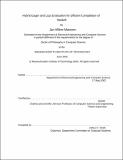Hybrid eager and lazy evaluation for efficient compilation of Haskell
Author(s)
Maessen, Jan-Willem
DownloadFull printable version (689.3Kb)
Other Contributors
Massachusetts Institute of Technology. Dept. of Electrical Engineering and Computer Science.
Advisor
Arvind.
Terms of use
Metadata
Show full item recordAbstract
The advantage of a non-strict, purely functional language such as Haskell lies in its clean equational semantics. However, lazy implementations of Haskell fall short: they cannot express tail recursion gracefully without annotation. We describe resource-bounded hybrid evaluation, a mixture of strict and lazy evaluation, and its realization in Eager Haskell. From the programmer's perspective, Eager Haskell is simply another implementation of Haskell with the same clean equational semantics. Iteration can be expressed using tail recursion, without the need to resort to program annotations. Under hybrid evaluation, computations are ordinarily executed in program order just as in a strict functional language. When particular stack, heap, or time bounds are exceeded, suspensions are generated for all outstanding computations. These suspensions are re-started in a demand-driven fashion from the root. The Eager Haskell compiler translates Ac, the compiler's intermediate representation, to efficient C code. We use an equational semantics for Ac to develop simple correctness proofs for program transformations, and connect actions in the run-time system to steps in the hybrid evaluation strategy. (cont.) The focus of compilation is efficiency in the common case of straight-line execution; the handling of non-strictness and suspension are left to the run-time system. Several additional contributions have resulted from the implementation of hybrid evaluation. Eager Haskell is the first eager compiler to use a call stack. Our generational garbage collector uses this stack as an additional predictor of object lifetime. Objects above a stack watermark are assumed to be likely to die; we avoid promoting them. Those below are likely to remain untouched and therefore are good candidates for promotion. To avoid eagerly evaluating error checks, they are compiled into special bottom thunks, which are treated specially by the run-time system. The compiler identifies error handling code using a mixture of strictness and type information. This information is also used to avoid inlining error handlers, and to enable aggressive program transformation in the presence of error handling.
Description
Thesis (Ph. D.)--Massachusetts Institute of Technology, Dept. of Electrical Engineering and Computer Science, 2002. Includes bibliographical references (p. 208-220). This electronic version was submitted by the student author. The certified thesis is available in the Institute Archives and Special Collections.
Date issued
2002Department
Massachusetts Institute of Technology. Department of Electrical Engineering and Computer SciencePublisher
Massachusetts Institute of Technology
Keywords
Electrical Engineering and Computer Science.